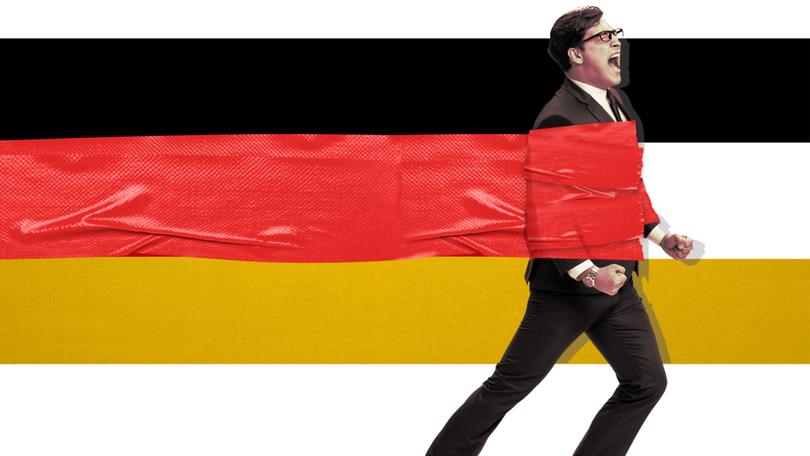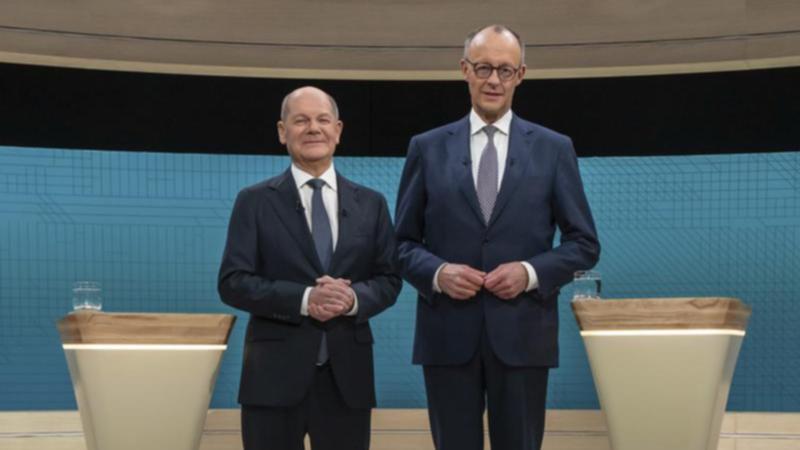THE ECONOMIST: Fears election won’t solve Germany’s problems as high costs and red tape ‘suffocate’ business
Many bosses fear that Germany’s upcoming election will fail to reverse the crisis gripping the nation.

On a drive around the vast production site of SKW Stickstoffwerke Piesteritz, Germany’s largest producer of ammonia, near Wittenberg, a spokesman for the firm points at a giant yellow valve. “Normally around 2 per cent of Germany’s industrial consumption of natural gas comes out of this thing,” he says. Last month, however, SKW shut one of the two ammonia plants at the site and slashed its production of fertiliser.
“The Gasumlage is killing us,” says Petr Cingr, the Czech chief executive of SKW, referring to the German government’s gas levy. (The 110-year-old firm is owned by Agrofert, a Czech conglomerate.) The charge, introduced in 2022 to recoup the cost to the government of filling the country’s strategic reserve after Russia’s invasion of Ukraine, was increased at the start of this year by 20 per cent, to €2.99 ($4.95) per megawatt hour.
Mr Cingr says his firm is paying ten times more for natural gas than Russian makers of fertiliser, with which it still competes, and seven times more than American rivals — and gas makes up 90 per cent of the production cost. Its price, along with Germany’s high labour costs and the CO2 certificates SKW must purchase to offset its emissions, mean the company can no longer break even.
Sign up to The Nightly's newsletters.
Get the first look at the digital newspaper, curated daily stories and breaking headlines delivered to your inbox.
By continuing you agree to our Terms and Privacy Policy.Mr Cingr has specific asks of the government that will take over after Germany’s parliamentary elections on February 23: abolish the gas levy and press the European Union to reform the system of CO2 certificates. On January 28 the bloc announced a gradual increase in tariffs on fertilisers from Russia and Belarus over the next three years, from 6.5 per cent to about 100 per cent.
That is “too little, too late,” says Mr Cingr. If politicians don’t do more, he argues, Europe’s production of fertiliser will collapse and farmers will depend entirely on imports.
SKW is but one example of the crisis gripping German business. At the annual press conference of the Federation of German Industries (BDI) late last month, Peter Leibinger, its new leader, said that the mood in business circles is “as bad as I have ever seen it”. Many bosses doubt that their biggest handicaps — red tape, high taxes and costly social-security contributions — will improve much following the election, after which Friedrich Merz, leader of the opposition Christian Democratic Union (CDU) party, is expected to become chancellor. Bosses are confident that whatever coalition emerges will be friendlier towards them than the one forged by Olaf Scholz, Germany’s current chancellor. But few believe that reforms will be fast or deep enough.
Germany’s manufacturing base is shuddering. Industrial output has fallen by about a tenth over the past two years. Giants such as Volkswagen, the world’s biggest carmaker by sales, are scaling back production in the country. Matthias Lapp, chief executive of Lapp, a family-owned maker of cables based near Stuttgart, describes Germany as “our problem child”. On February 3 his company reported sales of €1.8 billion for its most recent financial year, down by 5.3 per cent from the year before. Sales in Germany fell by 15 per cent; in Asia, America and the Middle East business is humming.
In a recent interview with the Augsburger Allgemeine, a daily newspaper, Nikolas Stihl, head of the supervisory board of Stihl, a chainsaw-maker, gave the next government an ultimatum. If it creates a more business-friendly environment within the next five years, the company will build, as planned, a new production site in Ludwigsburg. If not, the company will move the planned investment to Switzerland, where it is already making saws, trimmers and blowers.
Toralf Haag, boss of Aurubis, a maker of copper based in Hamburg, thinks this will be “a make-or-break year for German industry.” Bertram Kawlath, boss of Schubert & Salzer, a maker of valves, and head of the VDMA, Germany’s association of machinery-makers, agrees that Germany has reached a pivotal moment, though he is less pessimistic than other bosses.
“Our mid-size companies will not close down, but they will not invest in Germany if the country doesn’t become more business-friendly,” he says. The VDMA has 3600 members, most of which are family firms like his. Mr Kawlath’s biggest gripe is red tape, in particular a law that requires firms with more than 1000 employees in Germany to monitor whether their suppliers around the world meet human-rights and environmental standards.

Mr Merz is aware of the concerns of German bosses. He says that the country is “suffocating with red tape”, and has promised to lower the headline corporate-tax rate from 30 per cent to 25 per cent. If the CDU wins the election, the party wants to reduce electricity taxes and grid fees by at least five cents per kilowatt hour, cut bureaucracy, ease rules on working hours, allow employed pensioners to earn an additional €2,000 a month tax-free and relax building restrictions, among other things.
Most bosses applaud those commitments, even if some grumble about the absence of a proposal to reform Germany’s burdensome public-pension system. They worry, though, that the CDU will be unable to deliver on its promises, given that the country is headed for a coalition government likely to consist of two or possibly three parties.
Jörg Kukies, Germany’s interim finance minister, is familiar with the challenges presented by such coalitions. He offers the example of efforts to digitise notaries’ services. Talk to any startup and they will complain about spending hours sitting in a notary’s office as every line of a contract is read aloud to them, says Mr Kukies.
But notaries tend to vote for the pro-business Free Democrats (FDP), a junior partner in Mr Scholz’s coalition. That made the FDP, normally zealous opponents of red tape, less enthusiastic about reform.
If he prevails on February 23 Mr Merz will have a daunting task. He has business leaders on his side, but so did Mr Scholz when he took over. The former head of the BDI, Siegfried Russwurm, now talks of the “lost years” under Mr Scholz. Germany cannot afford more of them.
Originally published as German business is being suffocated by high costs and red tape
